As of April 24, there are 685 cases of measles in 22 US states, the CDC reported, even as increasing reports of so-called anti-vax supporters refuse to vaccinate themselves or their children.
"This current outbreak is deeply troubling and I call upon all healthcare providers to assure patients about the efficacy and safety of the measles vaccine," CDC Director Robert Redfield said in a statement.
"And, I encourage all Americans to adhere to CDC vaccine guidelines in order to protect themselves, their families, and their communities from measles and other vaccine preventable diseases. We must work together as a nation to eliminate this disease once and for all," he added.
Measles is an extremely contagious virus that lives in the nose and throat mucus of infected individuals and is often transmitted to others through coughing and sneezing.
The virus is prevented with the MMR vaccine, which also protects against mumps (a viral infection that affects the salivary glands) and rubella (a viral infection identified by a distinctive red rash).
The CDC recommends that children get two doses of the safe and proven MMR vaccine, with the first dose administered between 12-15 months of age and the second dose at four-six years of age.
The record number of measles cases this year is mostly due to large outbreaks in Washington state, New York City and New York state.
According to the CDC, recent outbreaks are caused by unvaccinated US tourists that visit a country that has people suffering with the measles. The US tourist becomes infected and then returns home with the disease, infecting others in their community.
"When measles is imported into a community with a highly-vaccinated population, outbreaks either don't happen or are usually small. However, once measles is in an under-vaccinated community, it becomes difficult to control the spread of the disease," the CDC notes.
Many people are misinformed about vaccinations, according to the CDC, which is the primary reason that new outbreaks are occurring in the US.
"Some organizations are deliberately targeting these communities with inaccurate and misleading information about vaccines. CDC continues to encourage parents to speak to their family's healthcare provider about the importance of vaccination. CDC also encourages local leaders to provide accurate, scientific-based information to counter misinformation," the federal health group stated.
Earlier this month, UN global health watchdog the World Health Organization (WHO) released a statement reporting that measles cases have spread exponentially in 2019.
In the news release, the Geneva-based organization noted that cases rose by 300 percent within the first three months of 2019. To date, WHO estimates that that there have been 112,163 reported cases of measles in some 170 countries, Sputnik previously reported.




